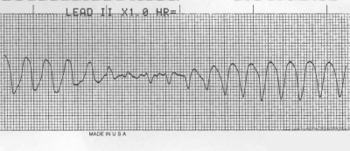Torsades de pointes: Difference between revisions
imported>Robert Badgett |
imported>Robert Badgett m (→Treatment) |
||
| Line 7: | Line 7: | ||
==Treatment== | ==Treatment== | ||
The initial treatment is | The initial treatment is [[magnesium]] according to the [[clinical practice guideline]]s for [[advanced cardiac life support]] by the [[American Heart Association]]:<ref name="pmid16314375_Part_7.2">{{cite journal |author= |title=2005 American Heart Association Guidelines for Cardiopulmonary Resuscitation and Emergency Cardiovascular Care: Part 7.2: Management of Cardiac Arrest |journal=Circulation |volume=112 |issue=24 Suppl |pages=IV1–203 |year=2005 |month=December |pmid=16314375 |doi=10.1161/CIRCULATIONAHA.105.166550 |url=http://circ.ahajournals.org/cgi/content/full/112/24_suppl/IV-58 |issn=}}</ref> | ||
* "When VF/pulseless VT cardiac arrest is associated with torsades de pointes, providers may administer magnesium sulfate at a dose of 1 to 2 g diluted in 10 mL D5W IV/IO push, typically over 5 to 20 minutes." | * "When VF/pulseless VT cardiac arrest is associated with torsades de pointes, providers may administer magnesium sulfate at a dose of 1 to 2 g diluted in 10 mL D5W IV/IO push, typically over 5 to 20 minutes." | ||
* "When torsades is present in the patient with pulses, the same 1 to 2 g is mixed in 50 to 100 mL of D5W and given as a loading dose. It can be given more slowly (eg, over 5 to 60 minutes IV) under these conditions." | * "When torsades is present in the patient with pulses, the same 1 to 2 g is mixed in 50 to 100 mL of D5W and given as a loading dose. It can be given more slowly (eg, over 5 to 60 minutes IV) under these conditions." | ||
Revision as of 19:25, 19 July 2008
In cardiology, Torsades de Pointes is a "malignant form of polymorphic ventricular tachycardia that is characterized by heart rate between 200 and 250 beats per minute, and QRS complexes with changing amplitude and twisting of the points. The term also describes the syndrome of tachycardia with prolonged ventricular repolarization, long QT intervals exceeding 500 milliseconds or bradycardia. Torsades de pointes may be self-limited or may progress to ventricular fibrillation."[1]
Causes/etiology
Torsades may be caused by drugs that prolong the QT interval.[2] A list of these drugs is available at the Arizona Center for Education & Research on Therapeutics.
Treatment
The initial treatment is magnesium according to the clinical practice guidelines for advanced cardiac life support by the American Heart Association:[3]
- "When VF/pulseless VT cardiac arrest is associated with torsades de pointes, providers may administer magnesium sulfate at a dose of 1 to 2 g diluted in 10 mL D5W IV/IO push, typically over 5 to 20 minutes."
- "When torsades is present in the patient with pulses, the same 1 to 2 g is mixed in 50 to 100 mL of D5W and given as a loading dose. It can be given more slowly (eg, over 5 to 60 minutes IV) under these conditions."
References
- ↑ Anonymous (2024), Torsades de pointes (English). Medical Subject Headings. U.S. National Library of Medicine.
- ↑ Roden DM (March 2004). "Drug-induced prolongation of the QT interval". N. Engl. J. Med. 350 (10): 1013–22. DOI:10.1056/NEJMra032426. PMID 14999113. Research Blogging.
- ↑ (December 2005) "2005 American Heart Association Guidelines for Cardiopulmonary Resuscitation and Emergency Cardiovascular Care: Part 7.2: Management of Cardiac Arrest". Circulation 112 (24 Suppl): IV1–203. DOI:10.1161/CIRCULATIONAHA.105.166550. PMID 16314375. Research Blogging.
External links
- http://torsades.org - Arizona Center for Education & Research on Therapeutics
